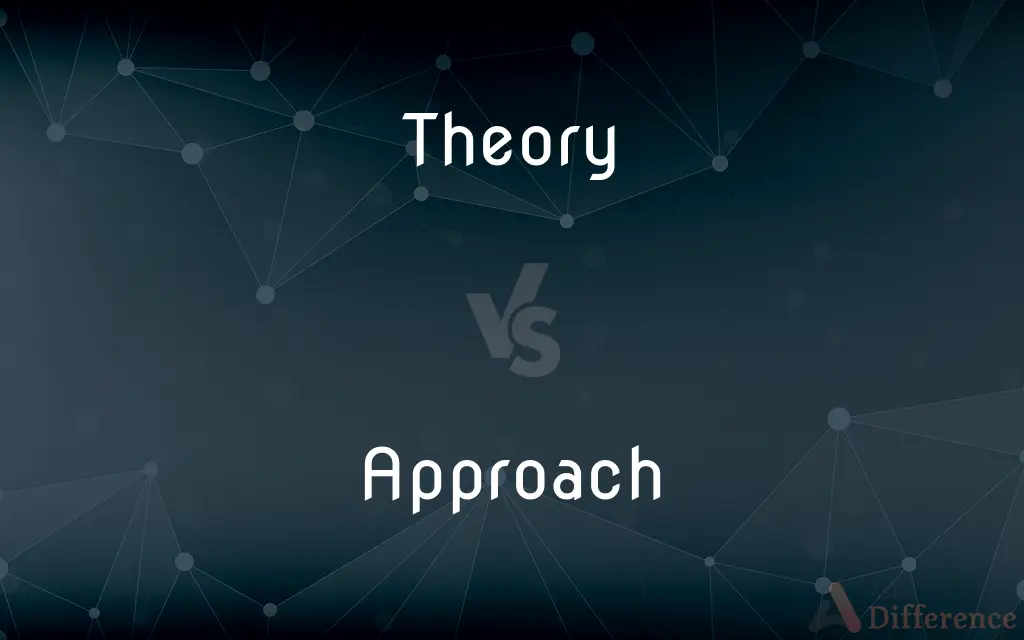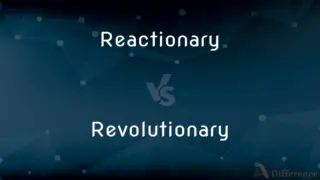Theory vs. Approach — What's the Difference?
By Tayyaba Rehman — Updated on October 22, 2023
Theory is a system of ideas explaining something, while an approach is a way of handling or dealing with a situation or problem.

Difference Between Theory and Approach
Table of Contents
ADVERTISEMENT
Key Differences
Theory represents a set of ideas or principles that explain certain phenomena or aspects of the world. It often emerges from systematic observations and aims to provide understanding and prediction. Approach, on the other hand, pertains to the manner or strategy employed to address a particular problem or situation. It's about the method or path chosen.
A theory can be foundational to multiple approaches. For instance, in psychology, a specific theory about human behavior might lead to various therapeutic approaches. While the theory provides the underlying rationale and understanding, the approach dictates the method or technique of intervention.
In many academic and professional contexts, theory offers a lens or framework to perceive a situation. Approach, meanwhile, would describe the practical steps or strategies one might take in light of that theoretical understanding. Hence, while theory deals with "why" and "what," approach deals with "how."
It's essential to differentiate between the explanatory power of a theory and the operational strategy of an approach. A theory, by its nature, might remain consistent over time unless new evidence challenges it. An approach, however, can be flexible, adjusting based on circumstances, desired outcomes, or new information.
Drawing from the realms of science, a theory might elucidate the behavior of a particular molecule, whereas the approach would detail the experimental procedures to study that molecule. Both are vital for progress – the theory for understanding and the approach for actionable insight.
ADVERTISEMENT
Comparison Chart
Definition
A set of ideas or principles explaining phenomena.
A method or strategy to address a problem or situation.
Function
Provides understanding and prediction.
Dictates practical steps or strategies.
Flexibility
Generally consistent unless challenged by new evidence.
Can be adjusted based on circumstances or outcomes.
Origin
Emerges from systematic observations or established knowledge.
Often derived from or influenced by a theory.
Application
Offers a lens or framework for understanding.
Describes the way something is done or approached.
Compare with Definitions
Theory
A set of statements or principles devised to explain a group of facts or phenomena, especially one that has been repeatedly tested or is widely accepted and can be used to make predictions about natural phenomena.
Approach
Approach is a method or way of doing something.
Her approach to teaching is interactive and student-centered.
Theory
Theory is a proposed explanation for an observed phenomenon.
The theory behind the disappearing bees relates to environmental changes.
Approach
Approach is the act of coming near or closer, in space or time.
The approach of winter brings colder temperatures.
Theory
Theory is a systematic framework formed by facts, evidences, and principles.
The cell theory in biology explains the properties and characteristics of cells.
Approach
Approach is the act of making contact or initiating communication.
Her approach to the stranger was friendly and open.
Theory
A theory is a rational type of abstract thinking about a phenomenon, or the results of such thinking. The process of contemplative and rational thinking is often associated with such processes as observational study or research.
Approach
To come near or nearer, as in space or time
Spring approaches.
Theory
The branch of a science or art consisting of its explanatory statements, accepted principles, and methods of analysis, as opposed to practice
A fine musician who had never studied theory.
Approach
(Sports) To make an approach, as in golf.
Theory
A set of theorems that constitute a systematic view of a branch of mathematics.
Approach
To come or go near or nearer to
Approached the tunnel.
Theory
Abstract reasoning; speculation
A decision based on experience rather than theory.
Approach
To come close to, as in appearance, quality, or condition; approximate
The performance approaches perfection.
Theory
A belief or principle that guides action or assists comprehension or judgment
Staked out the house on the theory that criminals usually return to the scene of the crime.
Approach
To make a proposal or overtures to with a specific end in view
Approached the administration for a raise.
Theory
An assumption based on limited information or knowledge; a conjecture.
Approach
To begin to deal with or work on
Approached the task with dread.
Approached the issue from a historical perspective.
Theory
A description of an event or system that is considered to be accurate.
Approach
The act of approaching
The approach of night.
Theory
(sciences) A coherent statement or set of ideas that explains observed facts or phenomena and correctly predicts new facts or phenomena not previously observed, or which sets out the laws and principles of something known or observed; a hypothesis confirmed by observation, experiment etc.
Approach
A fairly close resemblance; an approximation.
Theory
(uncountable) The underlying principles or methods of a given technical skill, art etc., as opposed to its practice.
Approach
A way or means of reaching something; an access
An approach to the bridge.
Theory
(mathematics) A field of study attempting to exhaustively describe a particular class of constructs.
Knot theory classifies the mappings of a circle into 3-space.
Approach
The method used in dealing with or accomplishing
A logical approach to the problem.
Theory
A hypothesis or conjecture.
Approach
An advance or overture made by one person to another.
Theory
A set of axioms together with all statements derivable from them; or, a set of statements which are deductively closed. Equivalently, a formal language plus a set of axioms (from which can then be derived theorems). The statements may be required to all be bound (i.e., to have no free variables).
A theory is consistent if it has a model.
Approach
The golf stroke following the drive from the tee with which a player tries to get the ball onto the putting green.
Theory
A doctrine, or scheme of things, which terminates in speculation or contemplation, without a view to practice; hypothesis; speculation.
Approach
The steps taken prior to executing a competitive maneuver, as by a diver before diving forward from a springboard or by a bowler before delivering the ball.
Theory
An exposition of the general or abstract principles of any science; as, the theory of music.
Approach
The part of the area behind the foul line in a bowling alley used by a bowler in delivering the ball.
Theory
The science, as distinguished from the art; as, the theory and practice of medicine.
Approach
(intransitive) To come or go near, in place or time; to move toward; to advance nearer; to draw nigh.
Theory
The philosophical explanation of phenomena, either physical or moral; as, Lavoisier's theory of combustion; Adam Smith's theory of moral sentiments.
Approach
To play an approach shot.
Theory
A well-substantiated explanation of some aspect of the natural world; an organized system of accepted knowledge that applies in a variety of circumstances to explain a specific set of phenomena;
Theories can incorporate facts and laws and tested hypotheses
True in fact and theory
Approach
Used intransitively, followed by to: to draw near (to someone or something); to make advances; to approximate or become almost equal.
He approaches to the character of the ablest statesman.
Theory
A tentative theory about the natural world; a concept that is not yet verified but that if true would explain certain facts or phenomena;
A scientific hypothesis that survives experimental testing becomes a scientific theory
He proposed a fresh theory of alkalis that later was accepted in chemical practices
Approach
Of an immovable object or a number of such objects: to be positioned as to (notionally) appear to be moving towards (a place).
As we drove along the driveway, the trees approaching the house seemed more eerie.
Theory
A belief that can guide behavior;
The architect has a theory that more is less
They killed him on the theory that dead men tell no tales
Approach
To move toward (someone or something) in place, time, character, or value; to draw nearer to.
“Would counsel please approach the bench?” asked the judge.
He approached the age of manhood.
Theory
Theory is a coherent group of tested propositions, commonly regarded as correct.
Einstein's theory of relativity revolutionized physics.
Approach
(transitive) To bring (something) near something else; to cause (something) to draw near.
Theory
Theory is a set of principles that form the basis of a subject or domain.
The theory of music underpins all forms of musical expression.
Approach
(transitive) To attempt to make (a policy) or solve (a problem).
Theory
Theory is an idea or belief about something, especially when not proven.
It's just a theory, but I think the system crashes due to a software bug.
Approach
(transitive) To bring up or propose to (someone) an idea, question, request, etc.
Approach
To take approaches to (a place); to move towards (a place) by using covered roads, trenches, or other works.
Approach
An act of drawing near in place or time; an advancing or coming near.
Approach
An act of coming near in character or value; an approximation.
Approach
An avenue, passage, or way by which a building or place can be approached; an access.
Approach
(climbing) A path taken to reach the climbing area, for example, from a car park, road, etc.
Approach
(figuratively) A manner of making (a policy) or solving (a problem, etc.).
Approach
(archaic) An opportunity of drawing near; access.
Approach
The way an aircraft comes in to land at an airport.
Approach
A specific procedure used for approaching and landing at an airport.
We flew the RNAV/GPS A approach to runway 16.
Approach
(bowling) The area before the lane in which a bowler may stand or run up before bowling the ball.
Approach
To come or go near, in place or time; to draw nigh; to advance nearer.
Wherefore approached ye so nigh unto the city?
But exhorting one another; and so much the more, as ye see the day approaching.
Approach
To draw near, in a figurative sense; to make advances; to approximate; as, he approaches to the character of the ablest statesman.
Approach
To bring near; to cause to draw near; to advance.
Approach
To come near to in place, time, or character; to draw nearer to; as, to approach the city; to approach my cabin; he approached the age of manhood.
He was an admirable poet, and thought even to have approached Homer.
Approach
To take approaches to.
Approach
The act of drawing near; a coming or advancing near.
A nearer approach to the human type.
Approach
A access, or opportunity of drawing near.
The approach to kings and principal persons.
Approach
Movements to gain favor; advances.
Approach
A way, passage, or avenue by which a place or buildings can be approached; an access.
Approach
The advanced works, trenches, or covered roads made by besiegers in their advances toward a fortress or military post.
Approach
See Approaching.
Approach
A stroke whose object is to land the ball on the putting green. It is made with an iron club.
Approach
That part of a flight during which an airplane descends toward the landing strip.
Approach
The steps taken by a bowler just before delivering the ball toward the pins.
Approach
Ideas or actions intended to deal with a problem or situation;
His approach to every problem is to draw up a list of pros and cons
An attack on inflation
His plan of attack was misguided
Approach
The act of drawing spatially closer to something;
The hunter's approach scattered the geese
Approach
A way of entering or leaving;
He took a wrong turn on the access to the bridge
Approach
The final path followed by an aircraft as it is landing
Approach
The event of one object coming closer to another
Approach
A tentative suggestion designed to elicit the reactions of others;
She rejected his advances
Approach
The temporal property of becoming nearer in time;
The approach of winter
Approach
A close approximation;
The nearest approach to genius
Approach
A relatively short golf shot intended to put the ball onto the putting green;
He lost the hole when his approach rolled over the green
Approach
Move towards;
We were approaching our destination
They are drawing near
The enemy army came nearer and nearer
Approach
Come near or verge on, resemble, come nearer in quality, or character;
This borders on discrimination!
His playing approaches that of Horowitz
Approach
Begin to deal with;
Approach a task
Go about a difficult problem
Approach a new project
Approach
Come near in time;
Winter is approaching
Approaching old age
Approach
Make advances to someone, usually with a proposal or suggestion;
I was approached by the President to serve as his adviser in foreign matters
Approach
Approach is a way of considering or dealing with something.
His approach to the problem was unconventional but effective.
Approach
Approach refers to the steps taken towards a goal or target.
The company's approach to customer service is commendable.
Common Curiosities
Is an approach always derived from a theory?
No, but often an approach is influenced by or based on a particular theory.
How does an approach differ in its function?
An approach dictates the practical steps or strategies to address a situation.
Can a theory be proven wrong?
Yes, theories can be challenged and replaced by new evidence or better explanations.
How does theory relate to hypothesis?
A hypothesis is a testable prediction often based on a theory; if proven, it can support the theory.
Is approach limited to methodology?
No, approach can refer to ways of thinking, strategies, or even physical advancements.
Can one theory support multiple approaches?
Yes, a single theory can lead to various approaches depending on its application.
What's the primary function of a theory?
A theory provides understanding and prediction about certain phenomena.
How can an approach be influenced by culture or context?
Cultural norms, values, or specific contexts can shape the way problems are approached or solutions are sought.
Do theories evolve?
Yes, theories can evolve as new evidence emerges or understanding deepens.
Can a theory exist without empirical evidence?
A theory can be proposed without evidence, but for wide acceptance, evidence is typically required.
Is every theory widely accepted?
No, theories can be controversial or debated until substantial evidence supports them.
Can an approach be both practical and theoretical?
Yes, some approaches can have both practical steps and underlying theoretical foundations.
Why might one choose a particular approach over another?
Choice of approach can be influenced by desired outcomes, available resources, or theoretical alignment.
How do theories impact scientific research?
Theories guide research by providing frameworks for understanding and generating testable predictions.
Can theories be applied across different fields or disciplines?
Some theories have universal applications, while others might be specific to a particular field or context.
Share Your Discovery

Previous Comparison
Bigfoot vs. Yeti
Next Comparison
Reactionary vs. RevolutionaryAuthor Spotlight
Written by
Tayyaba RehmanTayyaba Rehman is a distinguished writer, currently serving as a primary contributor to askdifference.com. As a researcher in semantics and etymology, Tayyaba's passion for the complexity of languages and their distinctions has found a perfect home on the platform. Tayyaba delves into the intricacies of language, distinguishing between commonly confused words and phrases, thereby providing clarity for readers worldwide.













































